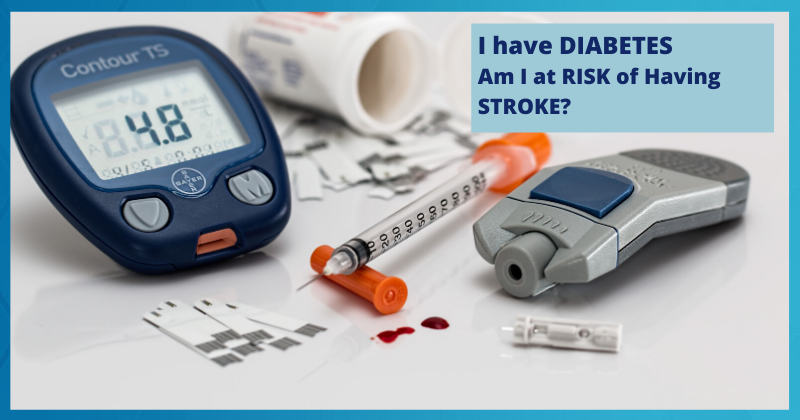Diabetes is not only a serious condition itself but is also responsible for increasing the vulnerability for many health conditions, stroke being one of them. Studies indicate that people suffering from diabetes have around 1.5 times greater chances of having a stroke, than people who do not have it. According to World Health Organisation (WHO), total number of people with diabetes is projected to increase to 366 million in 2030 from 171 million in 2000.
Diabetes affects the capabilities of the body to create insulin or put it to best uses. Insulin plays a very important role in filtering out the glucose from the bloodstream into the cells. People who suffer from diabetes, do not have this mechanism working quite efficiently, thus they are often left with extreme amounts of sugar in their blood. As time passes by, this extra sugar leads to the building up of clots or deposits of fat inside the vessels that are responsible for supplying blood to the brain and the neck. This is nothing but the process of atherosclerosis.
As a result of these deposits growing, the blood vessels often narrow down or can even get blocked completely. When the blood flow to the brain stops, there are chances of occurrence of a stroke.
What is a stroke and what are the types of it?
For the definition of a stroke, in a layman’s terms, stroke is a condition in which the blood vessels of the brain are damaged. A number of factors characterize the occurrence of a stroke, like the place in the brain where the blood vessels have been damaged, the size of the damaged blood vessel and the event responsible for the damage. Following are the types of strokes:
- Ischaemic stroke: This is the most common type of stroke and occurs when the artery supplying oxygen-rich blood to the brain, gets blocked. Most often the bran gets blocked due to a blood clot.
- Hemorrhagic stroke: This stroke happens when the artery in the brain ruptures or leaks blood. This is a very serious kind of stroke and is responsible for 40 per cent of deaths related to strokes.
- Transient ischaemic attack: Also known as TIA, this condition is often known as a mini-stroke as the blood flow to the brain gets blocked for a certain amount of time. This stroke does not result in a permanent neurological damage. TIA may last from a minute to many hours, till the clogged artery opens back. Often referred to as a warning stroke the symptoms should not be ignored.
What are the warning signs of stroke?
- Weakness or numbness on one side of the body
- Sudden confusion or trouble understanding
- Trouble talking
- Dizziness, loss of balance, or trouble walking
- Double vision
- Severe Headache
As the signs develop suddenly and as STROKE is a life-threatening disease, it is important to contact the emergency department as getting treatment as soon as possible after a stroke can help prevent permanent damage to your brain
A deep connection between stroke and diabetes
As we have already understood, diabetes increases the chances of stroke. To add to this, diabetes also makes it hard for the body to respond to stroke. When the oxygen supply gets cut off, the other arteries can normalise the situation by acting as a bypass. In case, a person suffering a stroke already has diabetes, the vessels may remain clogged or hardened with plaque, a condition which is known as atherosclerosis. Thus, the brain finds it hard to receive the supply of the blood.
With the passage of time, the high blood sugar levels can damage the nerves and the blood vessels. If the condition is not brought under control in time, a person with diabetes can suffer a stroke anytime. People suffering from diabetes are also vulnerable to suffer from other conditions that can increase the risks of having heart disease and stroke.
The American Heart Association have indicated in their findings that 16 % of the adults above 65 years and with diabetes, die from a stroke and 68 % die from other heart diseases. They have also warned that diabetes is one of the seven controllable risk factors for various kinds of cardiovascular diseases.
How to reduce the occurrence of a stroke in people who have diabetes?
While stroke is a disease of the blood vessels, diabetes affects blood vessels in addition to other organs. So, if diabetes can be controlled, its timely control and other sorts of precaution can lessen the risks of a stroke resulting from it.
- People need to take proper medications to lower associated risks.
- A dietary change is also beneficial for the prevention of strokes.
- Exercising regularly, at least for 2 hours and 30 minutes is of great help.
- The diet should include lots of vegetables.
- Quitting smoking would be really great.
- Maintaining good cholesterol levels is a very important preventive measure.
- A healthy weight should also be maintained.
If you have any health queries related to Stroke Medicine, Geriatric Medicine, Neurological Diseases in the Elderly and General Medicine, and need medical advice/second opinion, contact us on [email protected]
References:
- https://www.healthline.com/health/diabetes/diabetes-and-stroke
- https://www.webmd.com/diabetes/type-2-diabetes-guide/diabetes-stroke#1
- https://www.ncbi.nlm.nih.gov/pmc/articles/PMC3543806/

